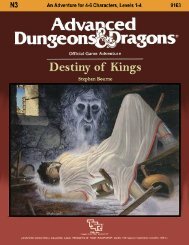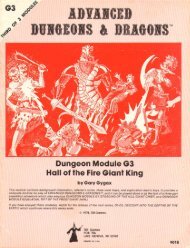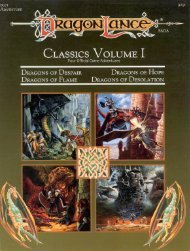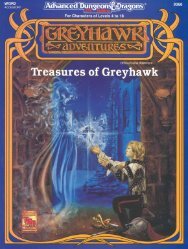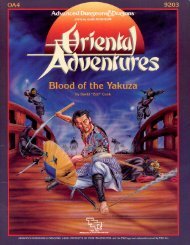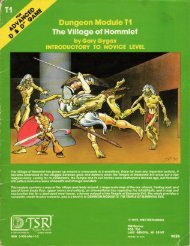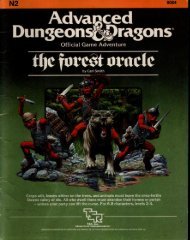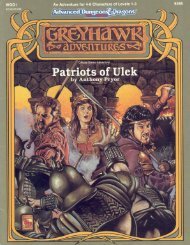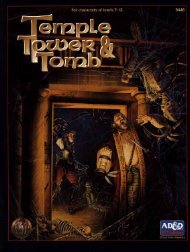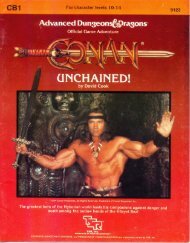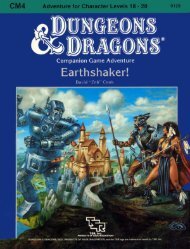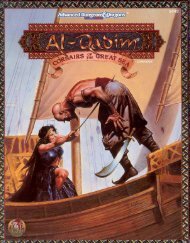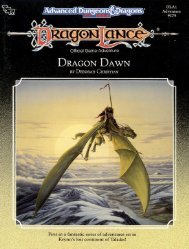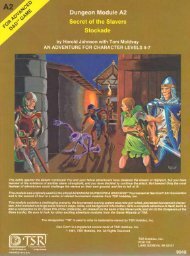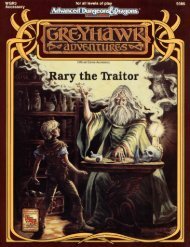H4 The Throne of Bloodstone.pdf - Free
H4 The Throne of Bloodstone.pdf - Free
H4 The Throne of Bloodstone.pdf - Free
You also want an ePaper? Increase the reach of your titles
YUMPU automatically turns print PDFs into web optimized ePapers that Google loves.
RUNNING 100th-LEVEL CHARACTERS<br />
A large part <strong>of</strong> the fun <strong>of</strong> playing the<br />
AD&D® game is the opportunity to<br />
do the impossible. Even at low levels,<br />
the thrill <strong>of</strong> entering a strange fantasy<br />
world where the laws <strong>of</strong> magic supersede<br />
the laws <strong>of</strong> science lets you slip<br />
loose from one reality and enter<br />
another one. But the characters who<br />
populate our favorite fantasy novels<br />
are much greater than the average<br />
characters who inhabit our campaign.<br />
Heret<strong>of</strong>ore, we’ve been encouraging<br />
you to moderate your lusts for power<br />
and play “ordinary” fantasy characters<br />
rather than the great heroes <strong>of</strong><br />
myth and legend.<br />
<strong>The</strong>re are, <strong>of</strong> course, quite good<br />
reasons for this. First and foremost,<br />
game balance is much easier to maintain<br />
when the power level <strong>of</strong> players is<br />
kept to reasonable levels. Even an<br />
experienced Dungeon Master can be<br />
overcome by a party <strong>of</strong> aggressive,<br />
super-powerful player characters.<br />
Another reason is our desire to<br />
maintain the illusion <strong>of</strong> reality—what<br />
science fiction writers refer to as the<br />
“willing suspension <strong>of</strong> disbelief.”<br />
Within our fantasies we maintain<br />
strict standards <strong>of</strong> realism. Ultimately,<br />
if you as players and DMs cannot<br />
believe in our illusions, we have<br />
failed you.<br />
Third, we have been suspicious <strong>of</strong><br />
the desire to play super-high level<br />
characters. We tend to believe that<br />
most people who want to play 100thlevel<br />
characters are motivated primarily<br />
by the desire to have unkillable<br />
PCs—thereby eliminating the challenge<br />
<strong>of</strong> the game. We believe that<br />
unkillable PCs and a never-ending<br />
supply <strong>of</strong> easy wealth may be attractive<br />
for a short while, but boredom<br />
with the game inevitably sets in, and<br />
the campaign eventually collapses.<br />
<strong>The</strong>refore, we advocate balanced<br />
games, where the rewards are given<br />
for heroism, skill, and excellent play.<br />
<strong>The</strong> AD&D game and the role-<br />
playing hobby are best served by people<br />
running fun, exciting games that<br />
can last a long time.<br />
In spite <strong>of</strong> these reasons, there are<br />
corresponding reasons why people<br />
want to play super-high characters<br />
legitimately. First, we believe, is the<br />
thrill <strong>of</strong> role playing great fantasy<br />
heroes—wizards with a seemingly<br />
endless arsenal <strong>of</strong> powerful spells, great<br />
fighters who can cleave an enemy from<br />
head to breastbone with a single blow,<br />
crafty thieves <strong>of</strong> ultimate skill and daring.<br />
<strong>The</strong>re is also the desire to test the<br />
ultimate limits <strong>of</strong> the game system, to<br />
“max-out” a character with everything<br />
that the AD&D game can provide.<br />
And finally there is the desire to confront<br />
in battle those creatures in the<br />
various monster manuals that are<br />
beyond the reach <strong>of</strong> ordinary mortals.<br />
<strong>The</strong> challenge was too great to<br />
resist (not that we tried very hard). It<br />
turned out to be easier than we<br />
thought, once we discovered the<br />
three principles <strong>of</strong> running 100thlevel<br />
characters: 100th-level characters<br />
are not 10 times more powerful<br />
than 10th-level characters; apply all<br />
the rules strictly; and never give a<br />
100th-level character an even break.<br />
Follow these strictures carefully, discuss<br />
them with your players, and you,<br />
too, can successfully run a superpowerful<br />
adventure!<br />
Four sample 100th-level PCs are<br />
described on pages 91 and 92.<br />
1. 100th-Level Characters Are Not<br />
10 Times More Powerful Than<br />
10th-Level Characters<br />
<strong>The</strong> relative power difference<br />
between levels tends to lessen dramatically<br />
as the levels increase. <strong>The</strong><br />
cleric, magic-user, and illusionist all<br />
reach the limit <strong>of</strong> the number <strong>of</strong> spells<br />
they can memorize at a time at 29thlevel.<br />
Above 19th-level for clerics and<br />
21st level for magic-users and illu-<br />
6<br />
sionists, there is no further decrease in<br />
number to hit AC0 (THAC0) or in<br />
saving throws. <strong>The</strong> cleric gets 2 more<br />
hp /level and the magic-user or illusionist<br />
gets 1 more hp/level and that’s<br />
all. That means a 100th-level cleric<br />
differs from a 29th-level cleric by a<br />
theoretical maximum <strong>of</strong> 142 hit<br />
points, and by nothing else. Now,<br />
142 extra hit points is nice, but<br />
against the level <strong>of</strong> opponents a<br />
100th-level cleric is liable to face, it is<br />
not a huge protection. Fighters can<br />
get huge hit point bonuses, but their<br />
lack <strong>of</strong> spell abilities or other special<br />
talents still keep them loosely within<br />
the bounds <strong>of</strong> reason, since their<br />
THAC0 and saving throws top out at<br />
level 17. Thief ability increases stop at<br />
17th level (23d for thief-acrobat), and<br />
the THAC0 and saving throws do not<br />
improve past 21st level.<br />
Another way that extremely highlevel<br />
characters differ from lowerlevel<br />
ones is in the number and power<br />
<strong>of</strong> the magical items they possess. A<br />
hundred or so extra hit points may<br />
not disrupt your game balance, but a<br />
fighter with a vorpal holy dancing<br />
luck blade +25, Intelligence 17, all<br />
primary abilities, extraordinary<br />
powers, special purpose powers, plus<br />
29th-level spell use and +50 bonus to<br />
wielder’s AC may be a little tough to<br />
handle. <strong>The</strong>re is a simple solution:<br />
restrict characters to the magical items<br />
listed in <strong>of</strong>ficial AD&D rule books,<br />
modules, and possibly DRAGON®<br />
Magazine, and don’t allow them to<br />
have artifacts. Even if 100th-level<br />
characters load themselves down with<br />
one <strong>of</strong> everything in the DMG, there<br />
are still limits—a fighter can hardly<br />
use more than two swords at a time<br />
(well, three if you use a sword <strong>of</strong><br />
dancing), a magic-user cannot wear<br />
more than two magical rings at the<br />
same time, and all characters must<br />
account for the encumbrance <strong>of</strong> all<br />
items carried.



